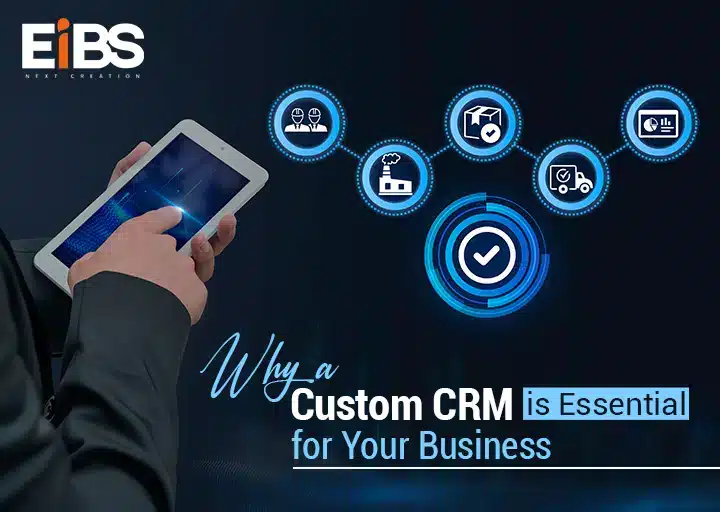
In today’s fiercely competitive business landscape, customer relationship management has become the cornerstone of business success. With millions of businesses vying for the attention of the same customers, leveraging a CRM system effectively can provide a significant edge. A custom CRM system is a tailored solution designed to meet the unique needs of your business. It streamlines workflows, automates repetitive tasks, centralizes customer data, and provides actionable insights that drive efficiency and growth.
Unlike generic CRM solutions, which may offer features that are irrelevant to your business, a custom CRM system integrates seamlessly with your processes, scales with your growth, and ensures regulatory compliance—all while boosting productivity, sales, and customer satisfaction.
This article delves deep into why a custom CRM system is essential, key features, benefits, implementation strategies, and real-world impact on business growth.
Understanding CRM Systems
Before diving into custom solutions, it’s important to understand what a CRM system is and why it matters.
A CRM system, or Customer Relationship Management system, is software that manages interactions with customers, prospects, and leads. It organizes data such as contact information, communication history, purchase behavior, and customer preferences. Modern CRMs go beyond just storing data—they provide automation, analytics, and integration capabilities that streamline operations and enhance customer relationships.
Businesses using a CRM system report significant improvements in sales efficiency, marketing effectiveness, and customer service quality. According to studies:
- 91% of companies with 10+ employees use a CRM system to manage customer relationships.
- CRM systems can increase sales by up to 29%, productivity by 34%, and forecast accuracy by 42%.
- Businesses using CRM software see an average ROI of $8.71 for every $1 spent.
While off-the-shelf CRM solutions work for some businesses, they often fall short of addressing specific workflows, operational needs, and scalability requirements. This is where custom CRM systems come in.

What is a Custom CRM System?
A custom CRM system is a solution developed specifically for your business. Unlike generic CRMs, it is designed to match your exact processes, integrate seamlessly with existing software, and adapt to your unique requirements.
A custom CRM:
- Aligns perfectly with your sales, marketing, and service workflows.
- Automates repetitive and business-specific tasks.
- Centralizes customer data to ensure accuracy and consistency.
- Provides advanced analytics tailored to your business goals.
- Ensures compliance with industry-specific regulations.
- Scales effortlessly as your business grows.
By investing in a custom CRM system, businesses are not just purchasing software—they are creating a strategic tool that drives efficiency, improves customer experience, and supports long-term growth.
Implementing a Custom CRM System
Implementing a custom CRM system requires careful planning and execution. Here’s a step-by-step approach:
Step 1: Analyze Business Processes
Identify your workflows, pain points, and objectives. Understand how sales, marketing, and customer service interact and what data is critical for your operations.
Step 2: Define Requirements
Outline the features, modules, and integrations needed. Determine automation needs, reporting requirements, and security protocols.
Step 3: Choose the Right Development Partner
Select a software development company with expertise in custom CRM solutions. They should understand your industry and provide scalable, secure, and user-friendly solutions.
Step 4: Development and Integration
The CRM system is developed and tested for seamless integration with your existing tools, including ERP, marketing automation, accounting, or e-commerce platforms.
Step 5: Training and Adoption
Ensure your team is trained on the system. Encourage adoption through user-friendly interfaces, ongoing support, and internal champions.
Step 6: Continuous Improvement
A custom CRM is not static. Continuously gather feedback, track performance, and implement updates to align with evolving business needs.
Real-World Impact of a Custom CRM System
Case Study 1: Retail Business
A retail company implemented a custom CRM to track customer purchase patterns, manage loyalty programs, and automate marketing campaigns. Within six months:
- Sales increased by 27%
- Customer engagement improved by 40%
- Marketing ROI increased by 35%
Case Study 2: Service Industry
A service-based company integrated its CRM with project management and billing software. The results:
- Improved team coordination and task management
- 25% reduction in manual errors
- Higher client satisfaction ratings due to timely service delivery
Case Study 3: Healthcare Provider
A healthcare provider implemented a custom CRM for patient scheduling, teleconsultation tracking, and billing. Outcomes included:
- Reduced appointment no-shows by 20%
- Streamlined communication across departments
- Enhanced patient experience and satisfaction
Common Misconceptions About Custom CRM Systems
Misconception 1: Custom CRMs Are Too Expensive
While the initial investment may be higher, the long-term benefits—automation, efficiency, reduced errors, and improved sales—make it cost-effective.
Misconception 2: Off-the-Shelf CRMs Are Sufficient
Generic CRMs often lack features tailored to your business processes. A custom CRM addresses your unique needs and grows with your business.
Misconception 3: Implementation Is Too Complex
With the right planning, development partner, and training, implementing a custom CRM can be smooth and efficient.
Future-Proofing Your Business with a Custom CRM System
A custom CRM system is not just software; it’s a strategic asset that positions your business for future growth. Key advantages include:
- Flexibility to adopt new technologies, such as AI-powered analytics or chatbots
- Scalable architecture to handle increasing data volume and users
- Continuous process optimization through automation and insights
- Better customer experience that fosters loyalty and retention
By investing in a custom CRM today, businesses can ensure long-term sustainability, operational efficiency, and competitive advantage.
Conclusion
A custom CRM system is essential for businesses that want to optimize workflows, save time, enhance customer relationships, and scale efficiently. It centralizes data, automates tasks, provides actionable insights, and ensures compliance with industry standards.
Investing in a custom CRM demonstrates your commitment to efficiency, customer satisfaction, and sustainable growth. It positions your business as forward-thinking, adaptable, and customer-centric.
EiBS is the leading software development company in India, specializing in custom CRM solutions tailored to your business needs. From analyzing workflows to delivering scalable, efficient, and secure CRM systems, EiBS ensures your business thrives in the digital age. Trust us to build a CRM system that powers your growth and strengthens your customer relationships.


